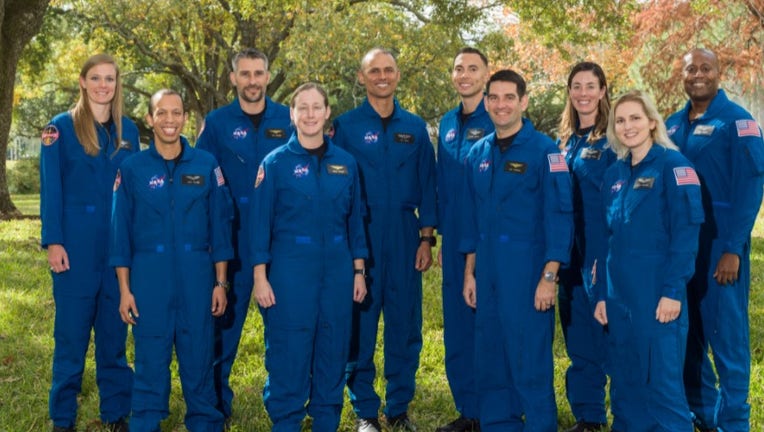NASA selects 10 new astronauts ahead of moon, Mars explorations

This photo provided by NASA shows its 2021 astronaut candidate class, announced on Monday, Dec. 6, 2021. The 10 candidates stand for a photo at the Johnson Space Center in Houston on Dec. 3, 2021. From left are U.S. Air Force Maj. Nichole Ayers, Chri
CAPE CANAVERAL, Fla. - NASA selected 10 new astronauts Monday, half of them military pilots, as it looks ahead to the moon and Mars.
The space agency introduced the six men and four women during a ceremony in Houston, home to Mission Control and the astronaut corps.
More than 12,000 applied for the coveted spots. The 10 selected are in their 30s and 40s, and face two years of training before becoming eligible for spaceflight.
RELATED: NASA astronauts replace damaged antenna on International Space Station
Besides the combat and test pilots, the astronaut candidates include a medical physicist, drilling specialist, maritime roboticist, NASA-turned-SpaceX flight surgeon and bioengineer who was a champion cyclist. Two astronauts from the United Arab Emirates will train with them.
One of the pilots — Air Force Maj. Marcos Berrios, who's from Puerto Rico — volunteered during a question-and-answer session to fly a life-size successor to NASA's mini helicopter at Mars.

The Laser Communications Relay Demonstration launched from The Laser Communications Relay Demonstration will launch from Kennedy Space Center in Florida Sunday morning and is tasked with using lasers to communicate in space in Florida this Sunday morning and is tasked with using lasers to communicate in space. LiveNOW from FOX's Rain Augustine speaks to NASA about the mission.
"I know Deniz, the other helicopter pilot here, and I would love to take it for a spin for science," he said, drawing laughs and applause from the audience.
Navy Lt. Deniz Burnham, an Alaskan, manages drilling projects throughout North America.
NASA has accepted 360 people into its astronaut corps since the original Mercury Seven in 1959. The previous astronaut selection was in 2017.
RELATED: SpaceX Starlink launch lights up Florida's sky
With SpaceX sending astronauts to the International Space Station and other private companies launching tourists on short rides, and NASA's Artemis moon-landing program on the horizon, "we are in the golden age right now of human spaceflight," said NASA chief astronaut Reid Wiseman.
NASA plans to put astronauts back on the moon no earlier than 2025.
The Associated Press Health and Science Department receives support from the Howard Hughes Medical Institute’s Department of Science Education. The AP is solely responsible for all content.

